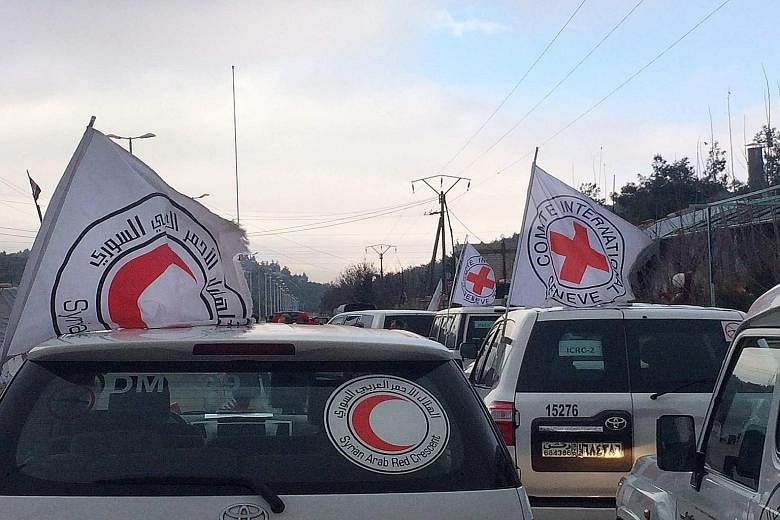BEIRUT • Ms Nisrine kept teaching in school for months as the siege tightened around the Syrian town of Madaya, but had to give up a few weeks ago when her students got too weak to walk to class. A local medic has been surviving on the rehydration salts he gives patients, while a business school graduate picks grass to make soup for his 70-year-old father, consulting shepherds about which ones their longsince-slaughtered flocks liked best.
The people of Madaya and neighbouring Zabadani have tried, since the siege by pro-government forces began in July, to keep society functioning and adjust to their surreal new set of dynamics. There is the black market across blockade lines, for instance, and the quiet or unexpected ways this type of warfare can kill: heart attacks, stillbirths, a step on a land mine while foraging for food.
And there is the relentless physical and psychological contraction of their communities, only an hour's drive from Damascus, Syria, and two from Beirut, yet suddenly sealed off from the outside world.
"I don't go anywhere," said Madam Maleka Jabir, 85, who is so disabled from hunger and heart problems she can hardly walk. "I just crumple up and stay in bed."

Convoys reached Madaya and two nearby towns on Thursday, taking basic food, medicine and aid for the second time this week. Although a limited number of people were evacuated on Monday, aid workers say hundreds of people in Madaya remain in acute need: At least 28 have died since Dec 1, according to Mr Khaled Mohammad, the medical worker surviving on salts.
Ms Hanaa Singer, Unicef's top official in Syria, said she was accosted during the aid visit to Madaya on Monday by a woman with six malnourished children. "She threw herself on me and kissed my shoulder and bent down to my hands," Ms Singer recalled. "She said: 'My 17- year-old son died of hunger. Please keep the rest of them alive.'"
This portrait of life in Madaya is drawn from interviews with more than a dozen residents, conducted over several months and in recent days by telephone and over the Internet; many spoke on the condition that they be identified only by first name, for safety.
After nearly five years of civil war in Syria, the United Nations estimates 400,000 people are trapped behind battle lines by the government, the Islamic State in Iraq and Syria group or rival insurgents.
While parts of Homs and the Damascus suburbs have been blockaded for years, Madaya survived relatively unscathed until last summer.
Madaya and Zabadani lie at the south-eastern end of the Qalamoun mountains, along Syria's border with Lebanon. Zabadani, where local rebels took control in 2012, became a haven for insurgents driven from other border areas by Hizbollah, the Lebanese Shi'ite militia allied with Syria's President Bashar Assad.
Local residents and Hizbollah officials say most of the fighters in Zabadani are affiliated with a Syrian Islamist group called Ahrar al-Sham, and smaller numbers with the more moderate Free Syrian Army and the Al-Qaeda-linked Nusra Front.
Weeks of bombardment last summer by Hizbollah did not dislodge the insurgents. Pro-government forces ramped up pressure by cordoning off Zabadani and Madaya, where many civilians from Zabadani - including Ms Nisrine, the teacher - had taken refuge. Looking for leverage, rebels allied with the local insurgents began blockading and bombarding Fouaa and Kfarya, two isolated Shi'ite towns in Idlib province, in Syria's north-west.
It worked, partly. A ceasefire was struck in September, but with Russia's new air campaign in Syria, promises to evacuate the wounded and lift the sieges were never carried out. Madaya residents say the siege tightened instead.
Once, said Mr Mohammad, medics persuaded Hizbollah guards to allow a 16-year-old boy with a bladder infection to leave for treatment. "We kissed their shoes," he said.
"We're ready to surrender, but the regime has frozen everything," he added. "I'm asking Bashar's regime to launch a rocket and end our lives."
NEW YORK TIMES

